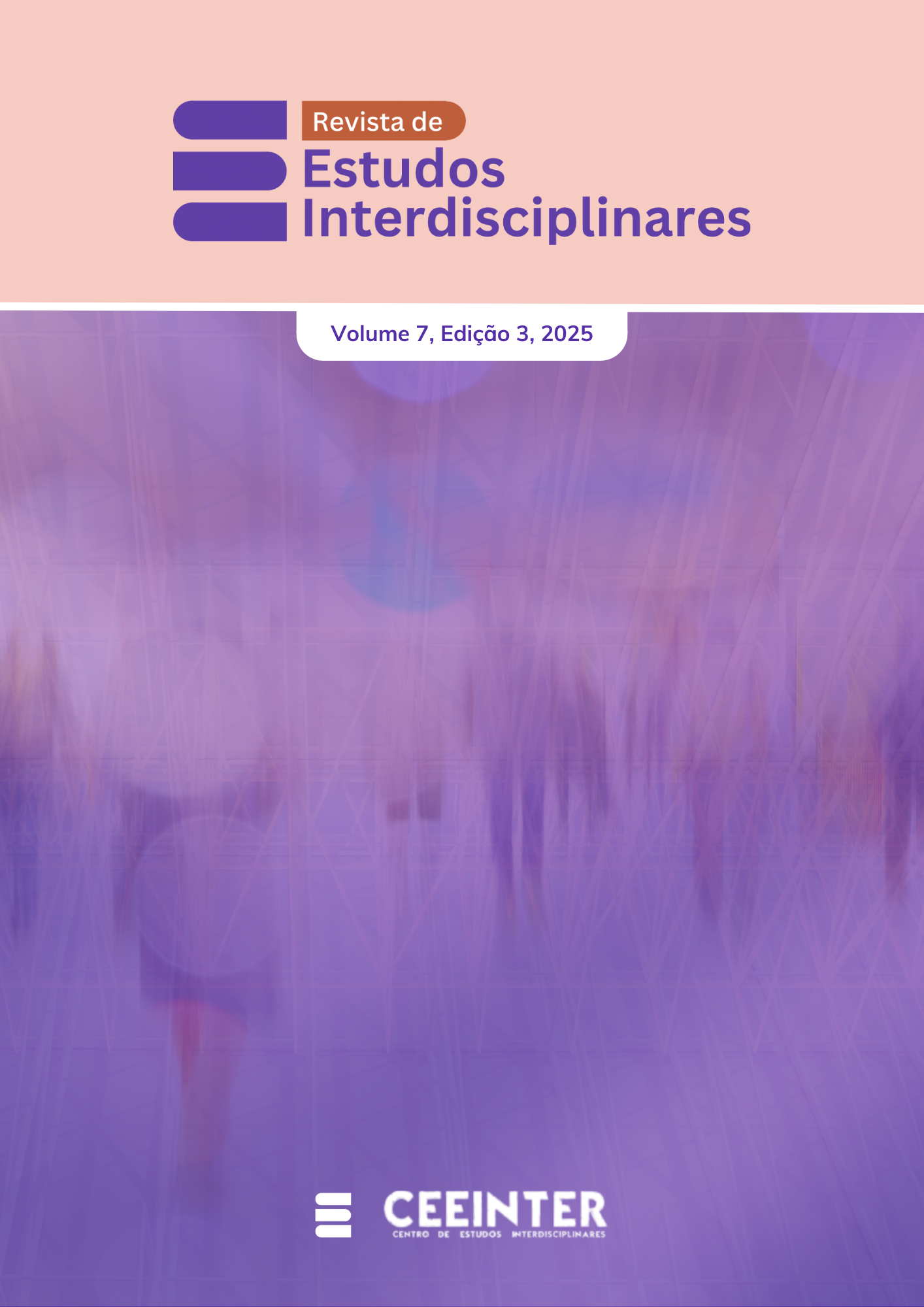CASSAVA ETHANOL
OPTIMIZING PRODUCTION THROUGH HARVEST AGE AND GLUCOSE ANALYSIS
Visualizações: 23DOI:
https://doi.org/10.56579/rei.v7i3.1704Keywords:
Biofuels, Enzymatic Conversion, Alcoholic FermentationAbstract
The study evaluated the ethanol production potential of four industrial cassava cultivars, considering the influence of harvest age and two glucose quantification methods on bioethanol yield. The research adopted an experimental and quantitative approach, analyzing glucose levels and enzymatic hydrolysis coefficients in samples harvested at 12 and 15 months. Two quantification methods were used: the Accu-Chek® Guide Me glucometer and calculations based on the hydrolysis coefficient. Results indicated that both harvest age and quantification method significantly affected ethanol yield, with higher glucose levels observed in samples harvested at 15 months and evaluated by the direct method. The BRS Formosa and BRS Mulata cultivars showed the highest potential for bioethanol production, standing out as promising alternatives in the bioenergy sector. The study concluded that the choice of cultivar, combined with the definition of ideal harvest age and the application of precise quantification methods, optimizes the bioethanol production process, making it more efficient and sustainable. These findings provided novel and practical data for cassava variety selection and contribute to the development of a more sustainable and economically viable production cycle.
Downloads
References
CASTAÑO-PELÁEZ, H. I. Producción de etanol a partir de yuca fresca utilizando la estrategia de proceso HEFS (hidrólisis enzimática y fermentación simultáneas) usando enzimas reductoras de viscosidad. Revista Politécnica, [S. l.], v. 16, n. 31, p. 19–28, 2020. DOI: 10.33571/rpolitec.v16n31a2. Disponível em: https://doi.org/10.33571/rpolitec.v16n31a2. Acesso em: 7 nov. 2024. DOI: https://doi.org/10.33571/rpolitec.v16n31a2
CORNEJO, F.; MALDONADO-ALVARADO, P.; PALACIOS-PONCE, S.; HUGO, D.; ROSELL, C. M. Impact of Cassava Starch Varieties on the Physiochemical Change during Enzymatic Hydrolysis. Molecules, [S. l.], v. 27, n. 18, 2022. DOI: 10.3390/molecules27186098. Disponível em: https://doi.org/10.3390/molecules27186098. Acesso em: 7 nov. 2024. DOI: https://doi.org/10.3390/molecules27186098
FATHIMA, A. A.; SANITHA, M.; TRIPATHI, L.; MUIRURI, S. Cassava (Manihot esculenta) dual use for food and bioenergy: A review. Food and Energy Security, [S. l.], v. 12, n. 1, 2023. DOI: 10.1002/fes3.380. Disponível em: https://doi.org/10.1002/fes3.380. Acesso em: 3 nov. 2024. DOI: https://doi.org/10.1002/fes3.380
FINGUERUT, J.; LEIMER, K.H.; LUCREDI, H.A.; ROSSELL, C.E.V. Estequiometria da fermentação alcoólica a partir do caldo de cana. Piracicaba: Copersucar, n. 12, p. 45-48, 1985. (Boletim Técnico Copersucar 35/85).
GROSSMANN, J.; FREITAS, A. C. Determinação do teor de matéria seca pelo peso específico em raízes de mandioca. Revista Agronômica, [S. l.], v. 160/162, n. 4, p. 75-80, 1950.
GYGLIOLA-ORMACHEA, P. B.; TARQUINO-FLORES, G.; CHAMBI-GUTIERREZ, E.; AVERANGA-CONDE, K.; SALCEDO-ORTIZ, L. Determinación de glucosa: El uso de glucómetros como prueba rápida de análisis Glucose determination: The use of glucometers as a rapid test of analysis. Journal of the Selva Andina Research Society, [S. l.], v. 11, n. 1, 2020. DOI: http://dx.doi.org/10.36610/j.jsars.2020.110100038. Disponível em: http://dx.doi.org/10.36610/j.jsars.2020.110100038. Acesso em: 3 nov. 2024. DOI: https://doi.org/10.36610/j.jsars.2020.110100038
HUANG, Z. Study on Technological Parameters of Pilot Production of Ethanol. American Journal of Energy Engineering, [S. l.], v. 7, n. 1, p. 39, 2019. DOI: 10.11648/j.ajee.20190701.15. Disponível em: https://doi.org/10.11648/j.ajee.20190701.15. Acesso em: 3 nov. 2024. DOI: https://doi.org/10.11648/j.ajee.20190701.15
KHVEDELIDZE, R.; KUTATELADZE, L.; SADUNISHVILI, T.; DARBAIDZE, Z.; ALEKSIDZE, T. Heat Stable α- and Glucoamylase Performing Deep Enzymatic Hydrolysis of Starch to Fermentable Glucose. European Scientific Journal ESJ, [S. l.], v. 15, n. 21, 2019. DOI: 10.19044/esj.2019.v15n21p34. Disponível em: https://doi.org/10.19044/esj.2019.v15n21p34. Acesso em: 2 nov. 2024. DOI: https://doi.org/10.19044/esj.2019.v15n21p34
KAYIKCI, Ö.; NIELSEN, J. Glucose repression in Saccharomyces cerevisiae. Oxford: University Press, 2015. DOI: https://doi.org/10.1093/femsyr/fov068
KRAJANG, M.; MALAIRUANG, K.; SUKNA, J.; RATTANAPRADIT, K.; CHAMSART, S. Single-step ethanol production from raw cassava starch using a combination of raw starch hydrolysis and fermentation, scale-up from 5-L laboratory and 200-L pilot plant to 3000-L industrial fermenters. Biotechnology for Biofuels, [S. l.], v. 14, n. 1, 2021. DOI: 10.1186/s13068-021-01903-3. Disponível em: https://doi.org/10.1186/s13068-021-01903-3. Acesso em: 7 nov. 2024. DOI: https://doi.org/10.1186/s13068-021-01903-3
MICHELE, O. Renewable Energy Alternatives: Bioetanol in Cassava as an Energy. International Journal Papier Advance and Scientific Review, [S. l.], v. 2, n. 1, p. 14–17, 2021. DOI: 10.47667/ijpasr.v2i1.72. Disponível em: https://doi.org/10.47667/ijpasr.v2i1.72. Acesso em: 7 nov. 2024. DOI: https://doi.org/10.47667/ijpasr.v2i1.72
NIU, L.; LIU, L.; ZHANG, J.; SCALI, M.; WANG, W.; HU, X.; WU, X. Genetic Engineering of Starch Biosynthesis in Maize Seeds for Efficient Enzymatic Digestion of Starch during Bioethanol Production. International Journal of Molecular Sciences, [S. l.], v. 24, n. 4, 2023. DOI: 10.3390/ijms24043927. Disponível em: https://doi.org/10.3390/ijms24043927. Acesso em: 2 nov. 2024. DOI: https://doi.org/10.3390/ijms24043927
OSARIBIE, N. A.; NDUBUISI, J. C.; EWA, O.; KARIMAH, M. R.; ODA, O. Optimization of Aspergillus niger α-amylase Activity for Enhanced Glucose Production from Cassava Starch. Asian Journal of Biotechnology and Bioresource Technology, [S. l.], v. 5, n. 4, p. 1–6, 2019. DOI: 10.9734/ajb2t/2019/v5i430065. Disponível em: https://doi.org/10.9734/ajb2t/2019/v5i430065. Acesso em: 2 nov. 2024. DOI: https://doi.org/10.9734/ajb2t/2019/v5i430065
PHACHANSEESOULATH, N.; KIM, S.; SHIN, J.; PARK, J.; KIM, R.; GEUM, S.; JEONG, D.; KIM, I. J.; KIM, S. R. The use of commercial wine yeast Saccharomyces cerevisiae EC1118 for cassava ethanol production at high solids loading. Korean Journal of Food Preservation, [S. l.], v. 29, n. 4, p. 653–661, 2022. DOI: 10.11002/kjfp.2022.29.4.653. Disponível em: https://doi.org/10.11002/kjfp.2022.29.4.653. Acesso em: 3 nov. 2024. DOI: https://doi.org/10.11002/kjfp.2022.29.4.653
R Core Team. R: a language and environment for statistical computing. Vienna: R Foundation for Statistical Computing, 2022.
SIMPSON-LAVY, K.; KUPIEC, M. Glucose Inhibits Yeast AMPK (Snf1) by Three Independent Mechanisms. Multidisciplinary Digital Publishing Institute: MDPI, 2023. DOI: https://doi.org/10.3390/biology12071007
SOUZA, T. S.; OLIVEIRA, J. S.; SOUZA, L. C. C. Glicosímetro digital aplicado a análise de açúcar redutor em polpa de frutas. Revista Ifes Ciência, [S. l.], v. 7, n. 1, p. 1–11, 2021. DOI: 10.36524/ric.v7i1.781. Disponível em: https://doi.org/10.36524/ric.v7i1.781. Acesso em: 2 nov. 2024. DOI: https://doi.org/10.36524/ric.v7i1.781
VELA, A. J.; VILLANUEVA, M.; LI, C.; HAMAKER, B.; RONDA, F. Ultrasound treatments of tef [Eragrostis tef (Zucc.) Trotter] flour rupture starch α-(1,4) bonds and fragment amylose with modification of gelatinization properties. LWT, [S. l.], v. 174, 2023. DOI: 10.1016/j.lwt.2023.114463. Disponível em: https://doi.org/10.1016/j.lwt.2023.114463. Acesso em: 2 nov. 2024. DOI: https://doi.org/10.1016/j.lwt.2023.114463
VÍTOR, L. A. D.; SIQUEIRA, G. B.; COLLICCHIO, E.; CAMPOS, G. A.; SANTOS, D. B. R. Produção sustentável de etanol: avaliação da eficiência da hidrólise enzimática no amido de mandioca. Desafios: Revista Interdisciplinar da Universidade Federal do Tocantins, [S. l.], v. 11, n. 7, 2024. DOI: https://doi.org/10.20873/. Disponível em https://doi.org/10.20873/Agroenergia_2024_v11_n7_17. Acesso em: 12 nov. 2024. DOI: https://doi.org/10.20873/Agroenergia_2024_v11_n7_17
YUANJIT, P.; VUTTIPONGCHAIKIJ, S.; WONNAPINIJ, P.; CEBALLOS, H.; KRAICHAK, E.; JOMPUK, C.; KITTIPADAKUL, P. Evaluation of Yield Potential and Combining Ability in Thai Elite Cassava Varieties for Breeding Selection. Agronomy, [S. l.], v. 13, n. 6, 2023. DOI: 10.3390/agronomy13061546. Disponível em: https://doi.org/10.3390/agronomy13061546. Acesso em: 3 nov. 2024. DOI: https://doi.org/10.3390/agronomy13061546
ZAMORA, L. L.; CALDERÓN, J. A. G.; VÁZQUEZ, E. T.; REYNOSO, E. B. Optimization of Ethanol Production Process from Cassava Starch by Surface Response Article. Journal of the Mexican Chemical Society, [S. l.], v. 54, n. 4, p. 198–203, 2019. DOI: https://doi.org/10.29356/jmcs.v54i4.906. Disponível em: https://doi.org/10.29356/jmcs.v54i4.906. Acesso em: 3 nov. 2024. DOI: https://doi.org/10.29356/jmcs.v54i4.906
ZHANG, H.; YANG, F. Q. α-Glucosidase-Mediated Glucometer Readout for Portable Monitoring of Acarbose and Migliol. Chemosensors, [S. l.], v. 10, n. 6, 2022. DOI: 10.3390/chemosensors10060198. Disponível em: https://doi.org/10.3390/chemosensors10060198. Acesso em: 3 nov. 2024. DOI: https://doi.org/10.3390/chemosensors10060198
ZHANG, H.; ZHANG, P.; WU, T.; RUAN, H. Bioethanol Production Based on Saccharomyces cerevisiae: Opportunities and Challenges. Fermentation, [S. l.], v.9, n.8, 2023. DOI: 10.3390/fermentation. Disponível em: https://doi.org/10.3390/fermentation9080709. Acesso em: 3 nov. 2024. DOI: https://doi.org/10.3390/fermentation9080709
ZHU, J.; BAI, Y.; GILBERT, R. G. Effects of the Molecular Structure of Starch in Foods on Human Health. Foods, [S. l.], v. 12, n. 11, 2023. DOI: 10.3390/foods12112263. Disponível em: https://doi.org/10.3390/foods12112263. Acesso em: 3 nov. 2024. DOI: https://doi.org/10.3390/foods12112263
Downloads
Published
How to Cite
Issue
Section
License
Copyright (c) 2025 Interdisciplinary Studies Journal

This work is licensed under a Creative Commons Attribution 4.0 International License.
The Journal of Interdisciplinary Studies adopts the Creative Commons Attribution 4.0 International License (CC BY 4.0), which allows for sharing and adapting the work, including for commercial purposes, provided proper attribution is given and the original publication in this journal is acknowledged.













